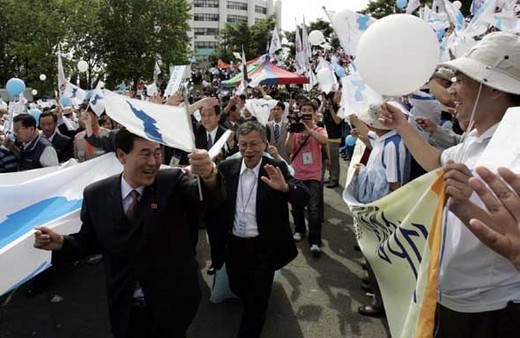 |
|
Delegates from the two Koreas are entering the outdoor Theater of Chosun Univeristy in Gwangju on June 15, where the 6 .15 National Unification Festival is being held. Gwangju/Kim Jung-hyo
|
Nobel laureate gathering coincides with festivities
Delegates from the two Koreas and overseas enjoyed the second day of the ‘6.15 National Unification Festival’ yesterday, held to celebrate the 6th anniversary of the June 15 South-North Joint Declaration, which pledges a spirit of cooperation between the North and South.
The festival, held in Gwangju, South Jeolla province, coincided with a gathering of Nobel Peace Prize laureates. Attendees to the three-day Nobel gathering include former South Korean president Kim Dae-jung, Shirin Ebadi from Iran, and former Soviet leader Mikhail Gorbachev.
The peace conference attendees will pay the their respects to those who have fallen in South Korea’s drive for democracy at the May 18 National Cemetery, where they will plant trees representing world peace. After that will begin an academic conference on theme of "The May 18 pro-democracy movement and peace on the Korean Peninsula" at the Kim Dae-jung Convention Center June 16-17. (On May 18, 1980, hundreds, possibly thousands, of pro-democracy protestors were killed in Gwangju by the South Korean military under then-president Chun Doo Hwan.) At the conclusion of the gathering, the laureates will draft and sign together a "Gwangju Declaration" for world peace. At the 6.15 National Unification Festival, delegates from Seoul and Pyongyang and representatives of civic groups from both countries came out one by one and read a joint appeal emphasizing a unification allowing for national independence. The appeal went on to ask for peace between the two countries. Regarding former president Kim’s planned visit to the North next month, Former unification minister Jeong Se-hyun, currently head of the working-level delegation planning former president Kim Dae-jung’s visit to Pyongyang next month, said that he would discuss the details with the North’s delegates during the celebration. Representatives of civic groups held meetings with laborers, farmers, students, and other members of the public in the fields of education, women’s rights, religion, the environment, and arts and culture. Meeting venues were spread throughout Gwangu. Delegations from the South and North governments held a closed forum in the afternoon, as did heads of civic delegations. Meanwhile, tension remains between the administrations of the two countries after recent comments by Ahn Kyung-ho, the secretary of the North’s Committee for the Peaceful Unification of the Fatherland, in which he said that "If the Grand National Party (GNP) comes into power, the [June 15 South-North Joint Declaration] will be null and North-South exchange and cooperation will come to a stop." The GNP is South Korea’s largest conservative political party, and just swept local-level elections on May 31. The party in general takes a hard-line stance toward the North. South Korea’s Unification Minister Lee Jong-seok response to the comment was that "both the GNP and the South Korean government want to see the development of the North, so please take a neutral attitude [toward South Korean political proceedings]."





